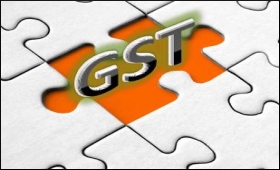|

|
States want lower threshold of Rs.10 lakh for levying GST
|
|

|
|
| Top Stories |
 |
|
|
|
SME Times News Bureau | 21 Aug, 2014
The Empowered Committee (EC) of state finance ministers Wednesday resolved to lower the threshold limit for imposing the proposed Goods and Services Tax (GST) from Rs.25 lakh (Rs.2.5 million) to Rs.10 lakh (Rs.one million) and asked that states be given the legal powers to collect tax from businesses with annual turnover of up to Rs.1.5 crore (Rs.15 million).
"So far as threshold limit is concerned, it was decided that it should be Rs.10 lakh in respect of general category of states and Rs.5 lakh for special category and NE states," EC Chairman Abdul Rahim Rather told mediapersons here after the meeting.
As per their recommendation, GST would not be imposed on businesses with an annual turnover of less than Rs.10 lakh. Currently, the threshold for Value Added Tax (VAT) is Rs.10 lakh in most states.
On the vexed issue of dual control of traders by both the union as well as state governments, the states recommended that they be given legal powers to collect tax from businesses with an annual turnover of up to Rs.1.5 crore. Those with below the turnover threshold of Rs.1.5 crore would pay their taxes to states, which would subsequently pass on to the Centre its share.
On the items exempted from the purview of GST, the EC suggested these should be mentioned in the constitutional amendment bill.
"So far, there are 96 items in the exemption list of states so far as VAT is concerned and so far as Cenvat is concerned there were 243 items. It was decided that we should try that this list should be harmonised and it should be same so far as central and state government is concerned," Rather said.
With state finance ministers having dropped the issue of compensation in lieu of a cut in the central sales tax (CST) from the agenda of their upcoming meeting on implementing the Goods and Services Tax (GST), the major hurdle appears to have cleared in reforming India's indirect tax regime.
Seen as a key to facilitating industrial growth and improving the business climate in the country, the GST Bill needs to be passed by a two-thirds majority in both houses of parliament and by the legislatures of half of the 29 states to become law.
CST was one of the major roadblocks for a GST, which was originally scheduled to come into effect from April 1, 2010.
While CST is levied by the Centre on inter-state movement of goods but is collected by the states, the issue of compensation arose because the Centre cut CST from four percent to two percent in phases after state-level value added tax (VAT) was introduced from April 1, 2005.
By subsuming most indirect taxes levied by the Centre and the states such as excise, service tax, VAT and sales tax, GST proposes to facilitate a common market across the country, leading to economies of scale and reducing inflation through an efficient supply chain.
The previous UPA government had introduced a bill in parliament proposing a GST council and a dispute resolution panel for fixing the rate of the new tax for both states and the Centre. However, the bill had received stiff opposition from the states, including the BJP-ruled ones like Gujarat and Madhya Pradesh.
"Some states have been apprehensive about surrendering their taxation jurisdiction, others want to be adequately compensated. I do hope we are able to find a solution in the course of this year and approve the legislative scheme, which enables the introduction of GST," Jaitley had said in his maiden budget speech in the Lok Sabha last month.
The finance minister has assured parliament that the government will seek to move the amendments to the constitution this year itself for implementing GST, besides already assuring states that he would clear their CST compensation dues of about Rs.34,000 crore ($5.5 billion) over a three-year period.
States like Gujarat, Madhya Pradesh and Uttar Pradesh, which were earlier standing in the way of GST, have now said they are not opposed to it as long as their concerns are addressed.
Full implementation of GST could lift India's gross domestic product (GDP) growth by 0.9-1.7 percentage points, according to a study by the National Council of Applied Economic Research (NCAER).
Wednesday's meeting of finance ministers was the first after the presentation of the budget for 2014-15 in parliament.
|
|
|
| |
|
|
|
|
|
|
|
|
|
|
|
|
|
|
| |
| Customs Exchange Rates |
| Currency |
Import |
Export |
US Dollar
|
66.20
|
64.50 |
UK Pound
|
87.50
|
84.65 |
Euro
|
78.25
|
75.65 |
| Japanese
Yen |
58.85 |
56.85 |
| As on 13 Aug, 2022 |
|
|
| Daily Poll |
 |
 |
| PM Modi's recent US visit to redefine India-US bilateral relations |
|
|
|
|
|
| Commented Stories |
 |
|
|
|
|
|
| |
|